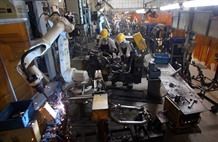 Economy
Economy

It is necessary to place automobile manufacturing, assembly and import in areas where enterprises must satisfy specific conditions to do business in, Deputy Minister of Planning and Investment Đặng Huy Đông said on Tuesday.
 |
| Workers at the Việt Nam Precision Industrial No1 Co Ltd in Vĩnh Phúc Province produce spare parts for cars and motorbikes. The Government has presented a scheme to add automobile manufacturing, assembly and import to a list of “investment and business areas with conditions” to the National Assembly. – VNA/VNS Photo Trần Việt |
HÀ NỘI — It is necessary to place automobile manufacturing, assembly and import in areas where enterprises must satisfy specific conditions to do business in, Deputy Minister of Planning and Investment Đặng Huy Đông said on Tuesday.
Đông told reporters during a meeting at the ministry’s headquarters in Hà Nội that the ministry came to the conclusion after considering the impacts such a requirement would have on consumers, businesses and the nation.
The Government has presented a scheme to add automobile manufacturing, assembly and import into a list of “investment and business areas with conditions” to the National Assembly.
This list is attached to the latest Investment Law, which took effect on July 1, 2015. It concretises Article 7, which says conditions for certain business fields are needed to ensure national defence and security, social order and ethics, and public health.
If adopted by the National Assembly, the areas supplemented to the list will be a basis for the Government to build a decree with detailed terms for automobile business activities, Đông said.
For example, bodywork welding and painting is to be subject to regulations that assure living quality near residential areas.
“When building the decree, authorities will take every car workshop into account and make sure that it cares about people’s lives and health, and social order,” he said.
Đông said applying conditions for automobile businesses will protect consumers against poor quality vehicles and promote safety.
While official automakers guarantee customers various parts of a car such as tyres, brakes and airbags, many unauthorised dealers sell cars under cursory contracts that do not provide customers with guarantee services in case their vehicles break down.
“It is hard for customers to be protected by law in the latter circumstance,” he said.
Healthy competition
Proper regulations will also foster healthy competition, a factor likely to facilitate cost reductions in the automobile market, he added.
Đông said there will be conditions to boost the development of automobile manafacturing and assembling enterprises in Việt Nam, and create equality between these firms and car importers.
He said manufacturers and assembling companies have to do many things from developing factories and distribution systems to training workers, while importers only buy cars from abroad and sell them on to earn profits.
“We don’t think this is equality. If this continues, no one will pour capital into production and assembly anymore,” he said.
Over the last few months, some citizens said that future conditions could hinder small businesses from entering the automobile market, as the conditions are difficult to fulfill.
They also argued that the conditions might go against national efforts to create a better business environment, where the Government aims to supervise enterprises in post-licensing phases instead of controlling their establishment.
Regarding these, Đông said: “Conditions doesn’t equal restrictions. Anyone can do business if they meet the conditions. Every country must have business standards and they should be easy to follow with low performance costs and without gaps for mercenary administrative officials.”
“There are some tycoons who import cars opposing the conditions, and they overlook national interests for their own profits,” he said.
“We as a State management agency must listen to all, while putting national interests first,” he added.
Car industry
As to the impact of automobile business conditions on the economy, Đông said an important thing is that they encourage the development of a car industry in Việt Nam.
A ministry statement said the Government plans to have long-term policies to drive manufacturing and assembling companies to invest in the automobile industry as part of a national strategy to develop this area.
The strategy stimulates production establishments, technology transfer and development of part industries to increase domestic contents in future vehicles.
Đông said Việt Nam, with about 94 million people and a growing economy, is a very promising market for automobiles. The industry is expected to contribute about 5 per cent, or US$30 billion, to national gross domestic product (GDP) by 2030.
Currently, the area contributes about 2 per cent of GDP and generates jobs for roughly 100,000 workers.
There are 46 companies authorised by global automakers, such as Audi, BMW, Renault, Ford, Mercedes, Toyota, Honda, Mazda, Kia and Huyndai, to deal their vehicles in Việt Nam.
Some firms involved in Audi, BMW and Renault focus on imports, while the other businesses prioritise domestic production.
The Việt Nam Automobile Manufacturers’ Association (VAMA) with 17 members including GM, Suzuki and Vinamotor produced 173,000 car last year, representing more than 70 per cent of the vehicle supply in the local market.
Đông said if the domestic automobile industry is developed, it will enrich the State budget, guarantee the national balance of payment, and help the country avoid becoming an industrial waste ground.
He affirmed that business conditions are indispensable premises for the quality development of the industry, although to some extent, they may discourage some small businesses, constrain product diversification, and reduce budget collection from imports.
In its statement sent to the National Assembly, the Government also proposed lawmakers retain car warrantees and maintenance services among areas subject to business conditions. — VNS




